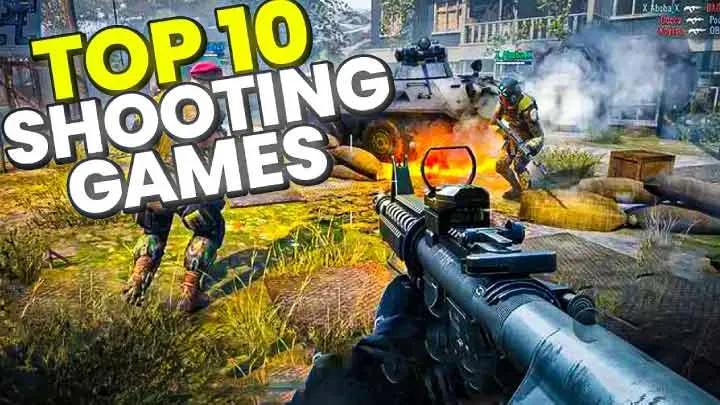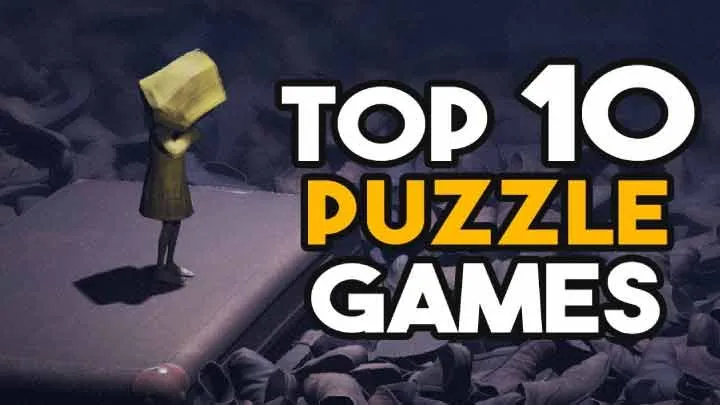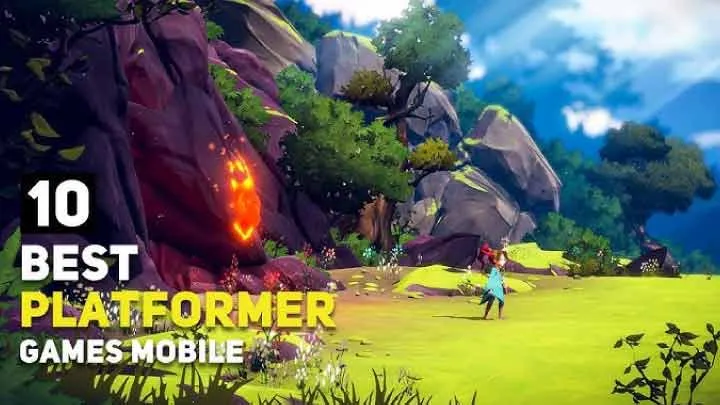Project Zomboid is a brutally realistic survival sandbox set in a zombie apocalypse. With its deep mechanics, permadeath system, and unforgiving world, it challenges players to think, plan, and adapt. Whether you're a newcomer or a returning survivor, mastering the game requires more than just swinging a bat—it demands strategic thinking, resource management, and a deep understanding of its systems. This guide walks you through how to survive and thrive in Project Zomboid, organized chronologically and thematically to help you progress from your first day to long-term survival.
Day One: Starting Out and Securing Shelter
Your first day in Project Zomboid is critical. You spawn in a random house with limited supplies and no idea what’s outside. The goal is simple: survive the first 24 hours.
Immediate Priorities
- Search the house for food, water, and weapons
- Close curtains or sheets to block visibility
- Check for nearby zombies before exiting
Shelter Strategy
Choose a house with few windows and easy escape routes. Avoid urban centers early on. Barricade doors and windows with planks and nails if available. Sleep only when safe—zombies can break in overnight.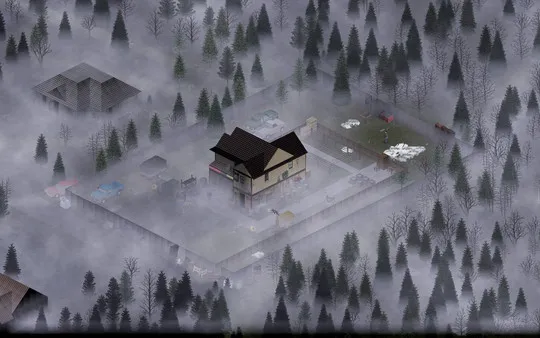
Early Game: Looting Essentials and Avoiding Combat
Once you’ve secured shelter, it’s time to loot nearby buildings. But combat should be avoided unless absolutely necessary—your character is weak, and noise attracts hordes.
Loot Priorities
- Food (non-perishables like canned goods)
- Water containers (mugs, bottles)
- Weapons (baseball bat, hammer)
- Medical supplies (bandages, disinfectant)
Stealth Tips
- Use “sneak” mode to reduce noise
- Avoid sprinting unless escaping
- Use line-of-sight to your advantage—zombies can’t see through walls
Loot smart, stay quiet, and never get greedy. One wrong move can end your run.
Mid Game: Building Skills and Managing Moodles
As you survive longer, your character develops skills and moodles—status effects that reflect hunger, fatigue, boredom, and more. Managing these is key to staying alive.
Skill Building
- Read skill books to gain XP multipliers
- Practice carpentry by dismantling furniture
- Cook meals to improve cooking and reduce boredom
Moodle Management
- Eat regularly to avoid hunger and weakness
- Sleep in safe areas to prevent exhaustion
- Read books or watch TV to reduce boredom
Neglecting moodles leads to poor performance and increased risk. Keep your character healthy and mentally stable.
Crafting and Construction: Fortifying Your Base
Once you’ve found a safe location, it’s time to fortify. Crafting and construction allow you to build defenses, store supplies, and create a sustainable home.
Construction Basics
- Use a hammer, nails, and planks to barricade windows
- Build rain collectors for water supply
- Create storage crates for organizing loot
Crafting Tips
- Learn recipes from magazines and books
- Use the crafting menu to combine items
- Prioritize tools like saws, screwdrivers, and axes
A well-fortified base is your lifeline. Build smart, and always prepare for the worst.
Farming and Food Sustainability
Food spoils quickly in Project Zomboid. Farming offers a long-term solution, allowing you to grow crops and reduce dependence on looting.
Farming Setup
- Find seeds and farming tools
- Choose a sunny, zombie-free area for planting
- Use rain collectors or wells for irrigation
Crop Management
- Grow potatoes, cabbages, and carrots for reliable yields
- Protect crops with fences or walls
- Use compost bins to recycle spoiled food
Farming takes time, but it’s essential for long-term survival. Start early and rotate crops to avoid starvation.
Combat Mastery: Fighting Smart, Not Loud
Eventually, you’ll need to fight. Whether clearing a building or defending your base, combat in Project Zomboid is tactical and dangerous.
Weapon Types
- Melee: bats, axes, crowbars (quiet but risky)
- Ranged: pistols, shotguns (loud but powerful)
Combat Tips
- Aim for the head—zombies die faster
- Use push attacks to create space
- Fight in open areas to avoid being cornered
Never fight more than you can handle. Retreat is always an option—and often the smartest one.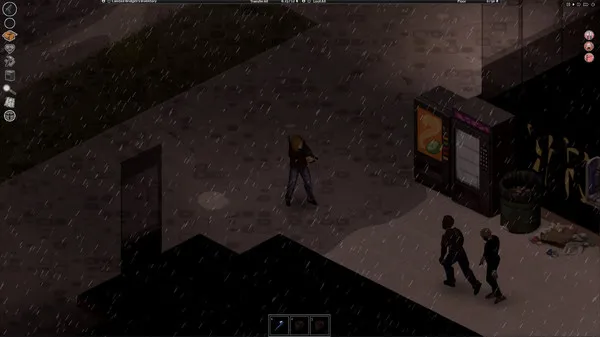
Vehicle Use: Mobility and Logistics
Vehicles offer mobility, storage, and escape options. But they require maintenance, fuel, and caution.
Finding and Using Vehicles
- Search parking lots and garages for keys
- Hotwire cars with the right skills
- Check fuel levels and engine condition
Vehicle Strategy
- Use cars to transport loot and explore distant areas
- Avoid driving through dense zombie zones
- Keep spare fuel and repair tools in the trunk
Vehicles are powerful tools—but noisy and vulnerable. Use them wisely and maintain them regularly.
Advanced Survival: Weather, Weight, and Illness
As the game progresses, new challenges emerge. Weather changes, weight fluctuations, and illness can all threaten your survival.
Environmental Hazards
- Cold weather increases fatigue and illness risk
- Rain reduces visibility and increases hypothermia
- Heat causes dehydration and exhaustion
Health Management
- Maintain a healthy weight through balanced meals
- Treat wounds quickly to avoid infection
- Use antibiotics and vitamins when sick
Survival isn’t just about zombies—it’s about managing every aspect of your character’s life.
Multiplayer Survival: Teamwork and Coordination
Project Zomboid supports multiplayer, adding new dynamics. Teamwork becomes essential, and coordination can mean the difference between life and death.
Multiplayer Tips
- Share roles: builder, looter, medic, scout
- Use voice chat or text for communication
- Build communal bases and share resources
Group Strategy
- Travel in pairs to reduce risk
- Assign tasks based on skills and traits
- Watch each other’s backs during combat and looting
Multiplayer adds depth and challenge. Trust your team, and work together to survive.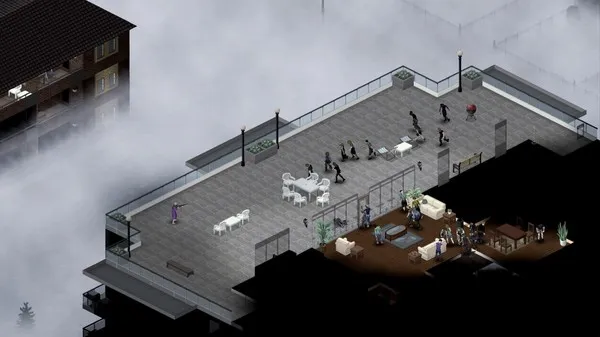
Long-Term Goals: Building a Legacy
Once you’ve mastered survival, it’s time to build a legacy. Create a thriving base, explore the map, and prepare for the future.
Endgame Objectives
- Build a self-sustaining farm and water system
- Create a secure compound with defenses and storage
- Explore cities like Louisville for rare loot
Personal Goals
- Max out skills and collect rare items
- Customize your base with furniture and decor
- Write your own story through journals or roleplay
Project Zomboid is a sandbox—your goals are your own. Survive, thrive, and leave your mark on the apocalypse.
Conclusion
Project Zomboid is a deep, unforgiving survival experience that rewards planning, patience, and adaptability. From your first day scavenging for food to building a fortified compound and mastering combat, every decision matters. This guide has walked you through the essential phases of survival, offering practical tips and strategies to help you thrive. Whether solo or in multiplayer, the apocalypse is yours to conquer—one smart move at a time.








